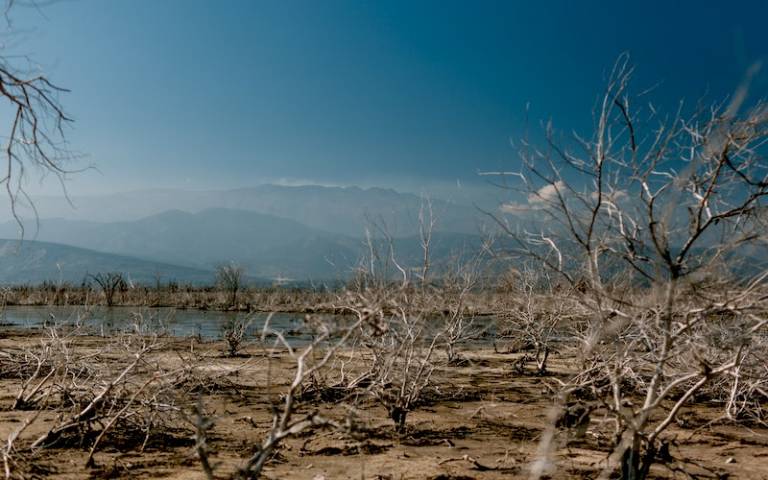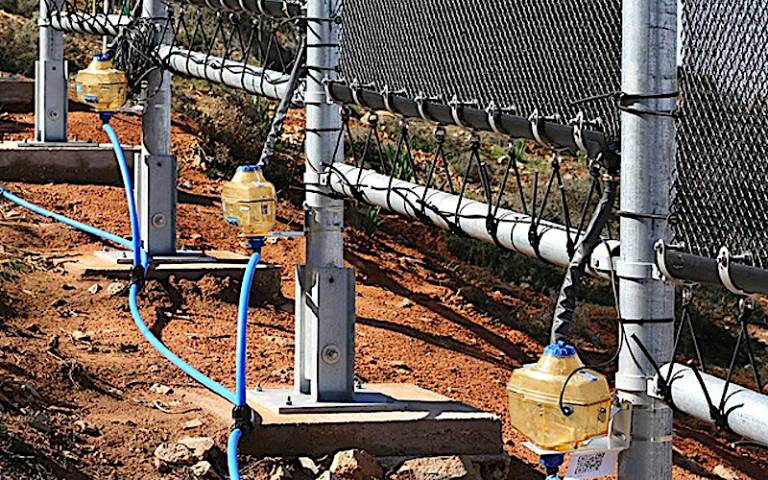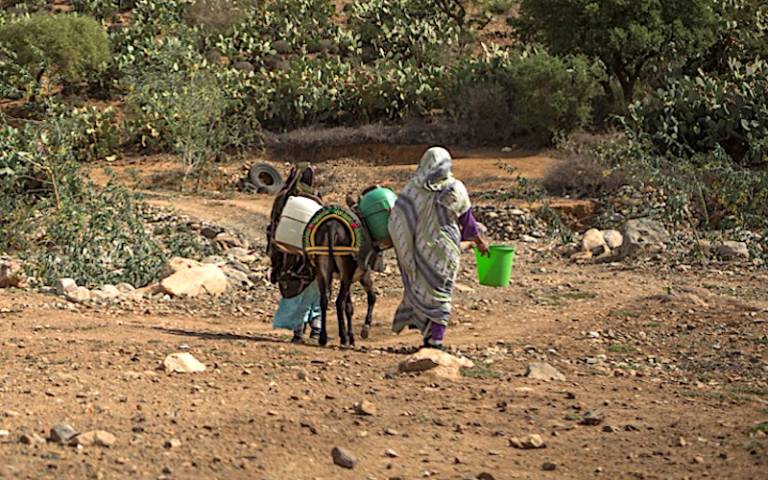Blog: Can harvesting fog to improve water access empower women?
9 June 2023
UCL Institute for Sustainable Resources student Natasha Savulescu has written a blog about harvesting fog to increase water access and the impact of this science upon the lives of women in Africa

Women and water scarcity
In 8/10 households where water is off-site, women and girls are responsible for water collection [1]. Whilst securing water, women often walk long journeys and have less time for other activities including education [2]. This cycle continues to drive gender inequality.
There is an urgency to achieve gender equality and clean water access by 2030, as outlined by Sustainable Development Goals 5 and 6 respectively [3]. Climate change will cause more severe and frequent droughts in the years ahead [4]. As water resources become increasingly scarce, women will continue to be harmed further.
Fog harvesting as a potential water solution
Fog harvesting innovation has been explored globally in arid areas that are cloud abundant but lack basic infrastructure [5]. Fog nets at high elevation capture water droplets from the surrounding air in their mesh. The trapped water runs off into a trough, which is funnelled into a reservoir for collection. This makes collecting drinking water less time consuming.
Fog nets have experienced a knowledge spill-over making them cheaper with improved engineering [6]. Fog harvesting projects therefore have the potential to help communities battle drought.

Women in Morocco have started drinking from the clouds

“Water is everything. A house without water is empty. Now we have more time.
– Woman discussing the Dar Si Hmad project [7].
Dar Si Hmad, a woman-led NGO, installed the largest global fog harvesting system in Aït Morocco [8]. This project has over 600 square meters of fog nets, which provides drinking water to more than 400 people, the majority of which are women and children [7].
There were several positive outcomes of this project contributing to empowerment. The freeing of time allowed for domestic and educational pursuits [8]. Furthermore, the interaction between the women-led NGO and women in the community boosted self- confidence [8]. This finding is consistent with research stating that fog harvesting coupled with gender and community mainstreaming can powerfully improve women’s perceptions of themselves and other women [9].
Challenges: applicability and acceptance
However, it’s important to realise that fog harvesting is not a silver-bullet solution to water access and gender inequality...
Fog harvesting can’t be used everywhere [6]. With climate change causing more severe weather and shifting fog patterns, the technology may become less useful in some areas.
When deploying any new technology, it is crucial to consider the cultural acceptability [10]. There should be open dialogues with local women prior to ensure that fog harvesting will be useful in their community. This collaboration will enhance understanding of their daily lives and can identify additional ways to spark empowerment.
Although fog harvesting increases women’s free time, it does not directly challenge the existing male power structures and cultural norms. Nonetheless, it can be useful to allow time for other specialised tools to target this, such as training workshops to raise critical consciousness and agency [11].
Fog harvesting alone may not fully empower women. However, it can be a valuable tool to improve water access and aid the journey of empowering women, if deployed in a strategic and effective manner.
References
World Health Organization (WHO) & The United Nations Fund (UNICEF), 2017. 'Progress on Drinking Water, Sanitation and Hygiene: 2017 Update and SDG Baselines'. Geneva. Available from: https://www.who.int/publications/i/item/9789241512893 (accessed 20 February 2023).
United Nations, n.d. 'Water and Gender'. Available from: https://www.unwater.org/water-facts/water-and-gender (accessed 20 February 2023).
United Nations, n.d. 'The 17 Goals'. Available from: https://sdgs.un.org/goals (accessed 1 March 2023).
Hoegh-Guldberg, O., Jacob, D., Bindi, M., Brown, S., Camilloni, I., Diedhiou, A., Djalante, R., Ebi, K., Engelbrecht, F., Guiot, J. & Hijioka, Y., 2018. 'Impacts of 1.5 C global warming on natural and human systems. Global warming of 1.5° C'. IPCC Special Report. Available from: https://www.ipcc.ch/site/assets/uploads/sites/2/2019/02/SR15_Chapter3_Low_Res.pdf (accessed 27 February 2023).
Qadir, M., Jiménez, G. C., Farnum, R. L. & Trautwein, P., 2021. 'Research history and functional systems of fog water harvesting'. Frontiers in Water, 37. Available from: https://www.frontiersin.org/articles/10.3389/frwa.2021.675269/full (accessed 2 March 2023).
Jarimi, H., Powell, R. & Riffat, S., 2020. 'Review of sustainable methods for atmospheric water harvesting'. International Journal of Low-Carbon Technologies, 15(2), 253-76. Available from: https://doi.org/10.1093/ijlct/ctz072 (accessed 27 February 2023).
Momentum for Change (UNFCCC), 2016. 'Morocco, Women-led fog harvesting for a resilient, sustainable ecosystem'. Available from: https://unfccc.int/mfc2016/project.html?p=morocco-fog-harvesting (accessed 20 February 2023).
Dodson, L. L. & Bargach, J., 2015. 'Harvesting fresh water from fog in rural Morocco: research and impact Dar Si Hmad's Fogwater Project in Aït Baamrane'. Procedia Engineering, 107, 186-93. Available from: https://doi.org/10.1016/j.proeng.2015.06.073 (accessed 25 February 2023).
Lucier, K. J. & Qadir, M., 2018. 'Gender and community mainstreaming in fog water collection systems'. Water, 10(10), 1472. Available from: https://doi.org/10.3390/w10101472 (accessed 27 February 2023).
Qadir, M., Jiménez, G. C., Farnum, R. L., Dodson, L. L. & Smakhtin, V., 2018. 'Fog water collection: challenges beyond technology'. Water, 10(4), 372. Available from: https://doi.org/10.3390/w10040372 (accessed 3 March 2023).
Leder, S., Clement, F. & Karki, E., 2017. 'Reframing womens' empowerment in water security programmes in Western Nepal' Gender & Development, 25(2), 235-51. Available from: https://doi.org/10.1080/13552074.2017.1335452 (accessed 3 March 2023).
Image credits
Designboom, n.d. 'CloudFisher turns fog into drinking water in driest region'. Available from: https://www.designboom.com/technology/cloudfisher-fog-net-water-foundation-02-02-17/ (accessed 6 March 2023).
Momentum for Change (UNFCC), 2016. 'Morocco, women-led fog harvesting for a resilient, sustainable ecosystem'. Available from: https://unfccc.int/mfc2016/project.html?p=morocco-fog-harvesting (accessed 20 February 2023).
Links
Image credit: pexels.com
 Close
Close

